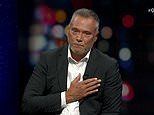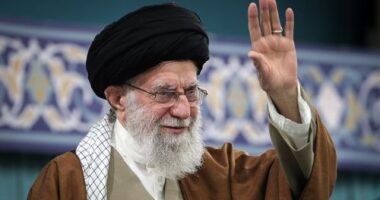
Stan Grant has accused the ABC of failing in its ‘duty of care’ toward him when he and his family were the target of racist abuse and death threats.
The experienced presenter and reporter recently discussed his views on the unsuccessful Voice referendum, the future of agreements in Australia, and the recent disrespectful behavior during the Welcome to Country ceremony at the Melbourne ANZAC Day dawn service in an interview with Jack Tame from TVNZ.
Grant, 61, quit as host of the ABC’s Q+A in May 2023 after being subjected to ‘relentless racial filth’.
He also criticized the ABC for what he described as a ‘systemic breakdown’ in how they handled the situation when he faced a barrage of abuse amid the Voice referendum.
‘I became a target, my family became a target and the level of abuse just grew louder and louder and louder,’ he said.
He expressed being deeply troubled by how he and his family were misinterpreted, receiving hurtful comments not just towards him but also his wife, children, and parents. Additionally, they faced death threats, and one individual even got apprehended and charged for their actions.
‘And throughout it all, I have to say with some sadness, a failure on the part of my employer to handle that and to be able to show proper duty of care to someone in my position who was exposed in ways that I couldn’t control.’
Grant said his decision to quit was to protect his family and his own sanity.
But he insisted he held no one at the ABC personally responsible.
‘I didn’t feel protected and supported as I should have done with my employer. I don’t necessarily blame them,’ he added.
‘They were swimming in waters that were far too deep for them.’
After leaving the ABC, Grant said he retreated into Yindyamarra, an Aboriginal philosophy encompassing respect and sitting in silence as a way of trying to understand others and the world around you.
The period of deep contemplation allowed him to change how he viewed the failure of the Voice referendum.
‘There was something existential about this vote for us as Aboriginal people,’ he said.
‘It wasn’t just a constitutional amendment, it felt like a vote on us. Inevitably, it does.
‘We live in a country where we are three percent of the population. We are the most disadvantaged people, we are the most impoverished, we are the most imprisoned.
‘We come out of very hard history. And that’s almost unknowable to many Australians because Australia is a postcard, and it’s beautiful, and it’s rich and it’s successful, and it’s multicultural and it’s peaceful. And they’re phenomenal achievements.’
He said he now saw the Voice as a a ‘political failure, rather than a moral failure’.
Grant also praised New Zealand for its approach to reconciliation with the Maori people.
‘It’s interesting being in New Zealand and the ease people move in out of the shared space.
‘You know that you are in a place that is founded on something that is very vertical, very deep and very shared – contested, yes and not evenly distributed – and I think the treaty goes a long way to that,’ he said.
He was referencing the Treaty of Waitangi, the foundational document in New Zealand’s history which established a relationship between the Maori and the British Crown.
‘Australia doesn’t have that. We don’t have treaties. We don’t have a constitutional recognition,’ Grant said.
‘There is still the overhang of Terra Nullius (a legal term meaning ‘nobody’s land’ in Latin) that it was claimed because we simply weren’t there in a legal sense. They are existential wounds that we have no dealt with.’
Grant said that he was faced with a choice between having to ‘imagine the Australia that I want or live in the Australia that I have’.
‘To imagine a treaty, the likes of which you have here (in New Zealand), in the Australian context is just not possible. We are not made that way.’
‘I navigate this now as more of a question of The Voice being a political failure rather than a moral failure.’
Grant was also asked about the ugly scenes during the ANZAC Day dawn service in Melbourne in which the Welcome to Country performed by Bunurong elder Mark Brown was met with heckles and boos from some agitators.
‘The wonderful thing about that is that the people who applauded the welcome and showed respect, far outweighed the small number of neo-Nazis, which is what they are, who had booed that Welcome,’ Grant said.
He said his immediate, gut reaction was to think ‘Australia hates us’ but his considered response allowed him to realise those who opposed the booing far outweighed the minority who were doing it.
But he criticised Peter Dutton for trying to score political points by seizing on the national discussion to say he thought Welcome to Country ceremonies were sometimes ‘overdone’.
He accused the former Opposition Leader of a ‘moral failure’.
‘To take that and land that in the midst of a culture war where once again Aboriginal people were a political football and it backfired.’
‘The conservative side of politics sought to inflict a moral injury out of what was a very hateful act from a very small number of people.’
Grant went further, claiming that criticism of Welcome to Country ceremonies was actually a ‘failure of Conservatism’.
‘What deeper conservative tradition could there be than a Welcome to Country that is thousands of years old? That is joined with an ANZAC service that is a solemn acknowledgment of sacrifice for the greater good,’ he said.
‘And to put those two beautiful traditions together creates a sacred space that we can all share in and any decent conservatism would seek to preserve that as a common good.’
Grant also turned his sights on the media in general, which he claims is responsible for ‘generating conflict and polarising debate’.
‘I really had to confront what I was doing and what I saw, I thought, in the complicity of media in the conflicts of our age,’ he said of his decision to quit the public broadcaster.
‘I started to see that the media in many ways was the poison in the bloodstream of our society.’
Since he quit the ABC two years ago, Grant has written a book about the failure of the Voice called Murriyang: Song of Time and has served as the Vice Chancellor’s Chair of Australian-Indigenous Belonging at Charles Sturt University.









